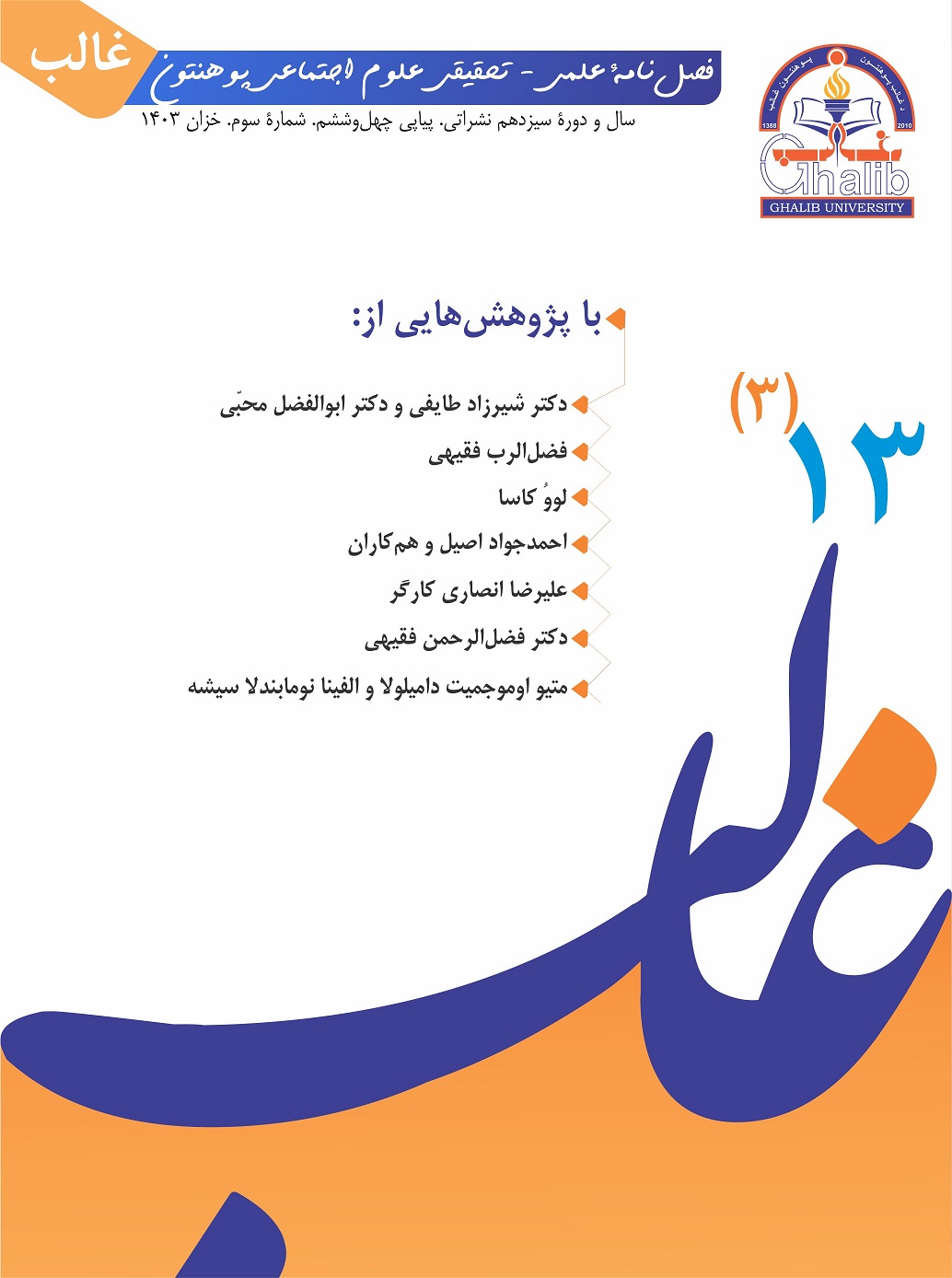A symbolic Reading of the Poem "Ta Inteha-E-Hozor" by Sohrab Sepehri
DOI:
https://doi.org/10.58342/ghalibqj.V.13.I.3.1Keywords:
Sohrab Sepehari, Symbol, Dream, Eternal night, Truth, RevelationAbstract
Sohrab Sepehri is one of the few contemporary poets whose tendency towards mystical thoughts is clear in his poems, and his poems have a surrealistic atmosphere. This is why Sepehri's poems have the necessary capacity for symbolical investigations. Symbolology is an approach that analyzes the symbols in the literary work to find their hidden meanings. In this research, Sohrab Sepehri's poem "Ta Inteha-E Hozoor" which is related to the notebook "Ma Hich, Ma Nagha" and the last poem of his poetical works, has been analyzed from symbology viewpoint and a new reading has been obtained from it. The research has been done with an analytical-descriptive-symbolological approach and relying on documentary and library studies. The aim of the current research is to see if it is possible to read Sohrab Sepehri's poem "Dar Inteha-E-Hozoor" with a symbolical approach and whether the meaning that will be obtained with this method has a purposeful relationship with the poet's lived experience or not. Based on this research, this question can be answered positively. There is a connection between Sepehri's lived experience and the mystical meaning of this poem. The findings show that in the poem "Dar Inteha-E-Hozor" it is about a dream-revelation in which the narrator goes to eternal time (Eternal Night) and looks at love, the development of life, the secret of eternity and truth with an insight eye.
References
قرآن کریم. ترجمه، توضیحات و واژهنامه از بهاءالدین خرّمشاهی. تهران: دوستان.
کتاب مقدس. (2012). ترجمۀ گروهی (مژده برای عصر جدید).
احمدی، بابک. (1392). ساختار و تأویل متن. تهران: مرکز.
جابز، گرترود. (1395). فرهنگ سمبلها، اساطیر و فلکلور. ترجمه و تنظیم محمدرضا بقاپور. تهران: اختران.
حافظ، شمسالدین محمد. (1394). دیوان حافظ. تصحیح غنی و قزوینی، به کوشش رضا کاکائی دهکردی. تهران: ققنوس.
ساور سفلی، سارا. (1388). خانة دوست کجاست (نقد و تحلیل اشعار سهراب سپهری). تهران: سخن.
سپهری، سهراب. (1389). هشت کتاب. تهران: بهزاد.
سعدی، مصلح بن عبدالله. (1386). کلیات سعدی. به اهتمام محمدعلی فروغی. تهران: امیرکبیر.
شمیسا، سیروس. (1388). راهنمای ادبیات معاصر. تهران: میترا.
شمیسا، سیروس. (1392). نگاهی به سپهری. تهران: صدای معاصر.
شمیسا، سیروس. (1392). بیان. تهران: میترا.
سیدحسینی، رضا. (1389). مکتبهای ادبی. ج 2. تهران: نگاه.
عزّالدین کاشانی، محمود ابن علی. (1387). مصباح الهدایه و مفتاح الکفایه. مقدمه، تصحیح و توضیحات از عفت کرباسی و محمدرضا برزگر خالقی. تهران: زوّار.
فتوحی، محمود. (1389). بلاغت تصویر. تهران: سخن.
کوپر، جین. (1397). فرهنگ نمادهای آیینی. ترجمۀ رقیه بهزادی. تهران: علمی.
گرانت، مایکل و جان هیزل. (1384). فرهنگ اساطیر یونان و روم. ترجمۀ رضا رضایی. تهران: ماهی.
گنون، رنه. (1398). سمبلهای بنیادین. ترجمۀ دلآرا قهرمان. تهران: حکمت.
مقدادی، بهرام. (1393). دانشنامۀ نقد ادبی از افلاتون تا به امروز. تهران: چشمه.
مولانا، جلالالدین محمد. (1387). متن و شرح مثنوی مولانا. مقدمه، تحلیل، متن و تعلیقات از محمد استعلامی. ج1 و 5. تهران: سخن.
هایدگر، مارتین. (1389). شعر، زبان و اندیشۀ رهایی. ترجمۀ عباس منوچهری. تهران: مولی.
یاحقی، محمدجعفر. (1398). فرهنگ اساطیر و داستانوارهها در ادبیات فارسی. تهران: صدای معاصر.
یونگ، کارل گوستاو. (1397). سمینار یونگ دربارۀ زرتشتِ نیچه. ترجمۀ سپیده حبیب. تهران: قطره.
References
Holy Quran. Translation, explanation and glossary by Bahauddin Khoramshahi. Tehran: Friends. (In Persian)
The Bible. (2012). Group translation (good news for the new age). (In Persian)
Ahmadi, Babak. (2012). Text structure and interpretation. Centeral Tehran. (In Persian)
Jobs, Gertrude. (2015). Culture of symbols, mythology and folklore. Translated and edited by Mohammadreza Bekapour. Tehran: Akhtaran. (In Persian)
Hafez, Shamsuddin Mohammad. (2014). Divan-e-Hafez. Corrected by Ghani and Qazvini, with the efforts of Reza Kakai Dehkordi. Tehran: Phoenix. (In Persian)
Sauer Sofli, Sarah. (1388). Where is the Friend's House. Criticism and analysis of Sohrab Sepehri's poems. Tehran: Sokhn. (In Persian)
Sepehri, Sohrab. (1389). Eight books. Tehran: Behzad. (In Persian)
Saadi, Mosleh bin Abdullah. (1386). Kliat Saadi To the attention of Mohammad Ali Foroughi. Tehran: Amir Kabir. (In Persian)
Shamisa, Cyrus. (1388). Guide to contemporary literature. Tehran: Mitra. (In Persian)
Shamisa, Cyrus . (2012). A look at Sepehri. Tehran: Contemporary Voice. (In Persian)
Shamisa, Cyrus. (2012). Expression. Tehran: Mitra. (In Persian)
Seyed Hosseini, Reza. (1389). Literary schools. C2. Tehran: Look. (In Persian)
Ezzeddin Kashani, Mahmoud Ibn Ali. (1387). Misbah al-Hadaya and Miftah al-Kafaya. Introduction, corrections and explanations by Efat Karbasi and Mohammad Reza Barzegar Khaleghi. Tehran: Zovar. (In Persian)
Fatuhi, Mahmoud. (1389). Image rhetoric. Tehran: Sokhn. (In Persian)
Cooper, Jane. (2017). Culture of ritual symbols. Translated by Ruqiyeh Behzadi. Tehran: Scientific. (In Persian)
Grant, Michael and John Hazell. (1384). Culture of Greek and Roman mythology. Translated by Reza Rezaei. Tehran: Mahi. (In Persian)
Gunon, Rene. (2018). Basic symbols. Translation of Delara Hero. Tehran: Hikmat. (In Persian)
Miqdadi, Bahram. (2013). Encyclopedia of literary criticism from Plato to today. Tehran: Cheshme. (In Persian)
Molana, Jalaluddin Mohammad. (1387). The text and commentary of Maulana's Masnavi. Introduction, analysis, text and notes by Mohammad Istilami. Volumes 1 and 5. Tehran: Sokhn. (In Persian)
Heidegger, Martin. (1389). Poetry, language and thought of liberation. Translated by Abbas Manouchehri. Tehran: Molly. (In Persian)
Yahaghi, Mohammad Jaafar. (2018). Culture of myths and stories in Persian literature. Tehran: Contemporary Voice. (In Persian)
Jung, Carl Gustav. (2017). Jung's seminar on Nietzsche's Zarathustra. Translated by Sepideh Habib. Tehran: Drop. (In Persian)
Downloads
Published
How to Cite
Issue
Section
License
Copyright (c) 2024 دکتر شیرزاد طایفی،دکتر ابوالفضل محبّی

This work is licensed under a Creative Commons Attribution 4.0 International License.













